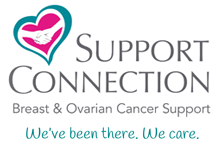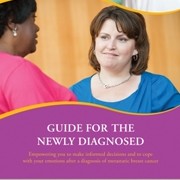Metastatic Breast Cancer Network and Living Beyond Breast Cancer have collaborated to create a free educational publication titled “Guide for the Newly Diagnosed: Empowering you to make informed decisions and to cope with your emotions after a diagnosis of metastatic breast cancer.” The following are some excerpts from the Guide:
Metastatic breast cancer, classified as stage IV disease, is cancer that has spread beyond the breast into other areas of the body. Metastatic disease is usually diagnosed when breast cancer has recurred (returned), months or even years after treatment for earlier stage disease. Breast cancer is metastatic at the time of diagnosis in approximately 10% or less of women with breast cancer.
Learning you have metastatic breast cancer can be overwhelming…you may be feeling and thinking many things all at once, and life may feel out of your control. It is natural to ask: Who can help me? What happens next? What do I do now?
Living well with metastatic breast cancer means different things to different people. But living well and living fully are very possible. From the day of your diagnosis forward, you may make small and large changes in your habits, routines and activities to address the challenges of living well with metastatic disease.
You are not alone; ask for help if you need it. You might even decide to seek out others living with metastatic breast cancer. Many people gain great strength from talking with those who share in the experience.
As much as caring for yourself is about controlling the cancer medically, another part of living with metastatic disease is feeling in charge of your everyday well-being. Knowing what makes life meaningful to you may help you as you choose medical treatments. Ask, will a certain treatment prevent me from doing the things I enjoy? Is the cost of losing that activity high or low? Everyone is different, so you may choose a treatment that others turn down—and that’s OK. Talk to your doctor about your goals. You may be able to take treatment breaks for special activities, like travel or family events.
You can feel more in control by learning as much as you can about the specific characteristics of your breast cancer, your treatment options and ways you can help make yourself healthier—physically and emotionally. Hundreds of survivors have credited regular exercise, yoga, healthy nutrition, time with family and friends, support groups, and spirituality as helping them thrive during treatment for metastatic breast cancer.
To download or order a free copy of the complete Guide, click here.

